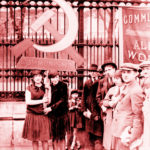
The Darkness at the End of the Tunnel: Artificial Intelligence and Neoreaction
As the consumer-oriented liberalism of Bill Gates and Steve Jobs gave way to the technological authoritarianism of Elon Musk and Peter Thiel, this strange foundation paved the way for “neoreaction,” or, in a distorted echo of Eliezer Yudkowsky’s rationalist vision, the “Dark Enlightenment.”
 Viewpoint Magazine
Viewpoint Magazine







